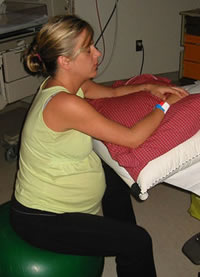Your Baby Development: 2 Weeks Old
How big is your baby?
This week your baby will be weighing around 7 3/4 pounds and measuring 20 1/2 inches if he was of average size at birth.
Baby Development Milestones This Week
Physical Development
- Arm, leg and hand movements are still reflexive
- Startles spontaneously (Moro Reflex)
- Hands are usually fisted or slightly open
- Stares at objects 8-12 inches away
- Roots for breast, even if not breastfeeding
- Is soothed easily by female voice
Mental & Social Development
- Alert 1 in every 10 hours
- Cries for assistance
- Quiets when held or sees faces
- Eyes fix on mothers face in response to smile
- Stares at faces
- Responds to human voice
Breastfeeding Your Baby
Some women may feel intimidated at the thought of breastfeeding outside the home and possibly offending other people and making them uncomfortable, even if it may be unintentionally. Did you know that in 17 states in American it is legal to breastfeed in public? This is because it is so important that if you are able to breastfeed your baby, you should.
Breastfeedign Benefits:
There are many good reasons why you should breastfeed your baby. Some of the non-nutritional reasons are that it is economical, and surely makes life easier as you don’t need to worry about making bottles etc. Below are some of the main reasons for breastfeeding:
- Breastfeeding offers protection from infection
- It may prevent diarrhea and it may inhibit growth of bacteria that cause urinary-tract infections
- It may lower the chances of your baby developing juvenile diabetes, lymphoma and Crohn’s disease later in life.
- Breast milk contains beneficial substances not found in other nutritional sources.
Disadvantages of breastfeeding are mainly that you as a breastfeeding mother become tied to your baby, unless you are going to try an express your milk. The other disadvantage is that you need to watch your diet very carefully. You are going to be passing any nutrition which you eat on to your baby. For example, if you eat spicy foods, the he/she is going to be getting all that as well. This could lead to digestive issues in your baby
Medication and Breastfeeding:
Should you have to take any medication while you are breastfeeding you may be a little concerned that this will effect your baby. Research has shown that most medication will not effect your ability to breastfeed, although some on the medication will be present in breast milk, most medications are not harmful to your baby.
Some drugs to avoid when breastfeeding are: illegal drugs, chemotherapy drugs, lithium, over the counter drugs and so on. The best advice is to speak to your health care provider before taking and medication at all.
Bathing Your Baby
What You will need for Bath Time
1. Large bath towel
2. Baby towel
3. A basin of warm water
4.Cotton Balls
5. Baby soap
6.Washcloth
At this early stage your baby will only need the occasional sponge bath, as his/her body isn’t getting dirty. The main areas which need attention and should always be kept clean are the genital area, which you should clean with every nappy change and as soon as there has been a bowel movement.
You should always wash your baby in a warm environment, free of drafts. Undress your baby and lay him on the bath towel, keeping your hand on him/her at all times! Wash his/her face first, wipe each eye outward with a damp cotton ball. Use a soft washcloth to wash his/her face and head, then pat dry with a towel.
Put some soap on the damp washcloth, and clean his/her neck, torso, arms and legs. Don’t forget his/her fingers and toes! Wash his/her genital area. If you have a son and he was circumcised the you will want to just use plain water on his genital area until the circumcision has healed completely.
Baby Sleeping Patterns
It is not uncommon that babies this young often have their days and nights mixed up, which can be stressful for you. You can try some different methods to teach him/her that day is the time for being active and night time is the time for sleeping. Remember that every baby is different, so you may have to experiment to find something that works.
- If you baby sleeps for one long period in 24 hours you should try and encourage him/her to sleep that period at night. This you can do by not letting him/her sleep longer than 4 hours each time during the day.
- Allow regular daytime house hold noises to occur, such as the radio, vacuum cleaner etc.
- When he/she is awake, expose him/her to family activities. Always keep your baby near so that you can talk and interact with him/her.
- When you do put your baby to sleep at night, keep it low key. Speak in soft tones, keep the lights low and don’t stimulate him/her.
- When you change or feed him/her at night, keep it dark and quite. Change his/her nappy quickly and quietly.
- Don’t wake your baby at night to feed him/her unless your doctor has specifically said you must.
Babys First Checkup
Your pediatrician will want to see your baby this week for his/her first checkup. Your baby will be a “new patient”, so be sure to take your insurance card with you and be prepared to fill out all sorts of forms.
You may be unsure as to how to prepare for the first visit, especially if this is your first baby. You should observe your baby closely and write down anything which you may feel is important, or want to ask. Consider some of the following areas to talk with your pediatrician about:
- Umbilical cord healing
- Baby’s sleep needs
- Baby’s weight and growth since birth
- Eating habits
- Colic and ways in which to deal with it.
- His/her personality
- Immunization schedule
- Circumcision or foreskin concerns
- Bowel movements
Your pediatrician/physician will advise you of the development milestones to watch for and give you a schedule of times for subsequent checkups, including your immunization schedule.
Bonding With Your Baby
So you are a new parent and have no idea how you can promote bonding with your baby, so here are some ideas and tips.
Daily Care:
Some women are afraid that if they don’t bond with their baby in the delivery room that it may never happen. This is simply NOT true! The daily care you give your baby as parents strengthens the bond between you and your baby. Bonding goes beyond an emotional attachment, as it includes a physical attachment as well.
Others can bond with your baby as well, especially siblings, caregivers and relatives.
Breastfeeding will be one of the better ways in which you and your baby can bond together. If you are bottle feeding your baby, then you can let your partner share the feeding responsibilities as well, to help him feel part of the scene and allow him to spend some quality bonding time together.
Bonding By Massaging
Baby massage is an excellent way in which to bond with your baby.
Find a quite spot to massage baby, keep the lights low. Rub baby oil on your hands so that they will glide over baby’s skin. Using the flattened palm of your hand rub his/her feet firmly, but gently, moving up his/her torso. Then rub his/her hands and arms. Make your strokes long and smooth.
Toys and Play For your Baby
Playing with your baby is interrelated with your baby’s social, mental and physical development and there are many ways in which you can play with him/her, but perhaps at this stage the best toys will be other people around him/her. The interaction with other people around is most stimulating.
Looking into your baby’s eyes will help promote developing the eye muscles and bonding at the same time. Hold your baby close and gaze into his/her eyes. He/She will look into your eyes for a bit and then look away, then look back at you.
To help stimulate his grasping reflex you can gently grasp his palm with your finger. He/she will grasp your finger by reflex, but this will help to strengthen the muscles.
Quick Tips For This Week
In order to help reduce the amount your baby spits up, keep him or her upright for 20 – 30 minutes after feeding and burping.



